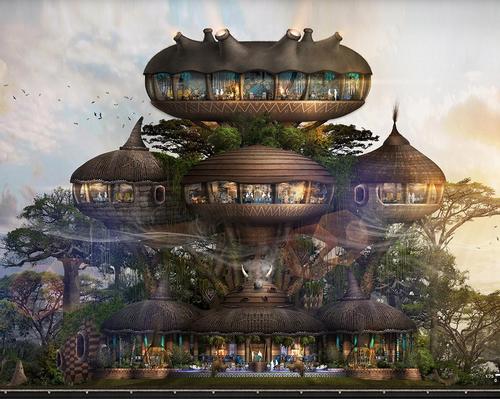01 May 2020
Bensley creating luxury ‘human zoo’ hotel and spa concept for multinational project in Asia, Australia and Africa
BY Megan Whitby

Architect Bill Bensley has announced plans for a luxury sustainable 'human zoo' hotel and spa project.
Bensley’s concept will involve guests staying like caged animals within a luxury hotel and looking out onto an expansive wildlife sanctuary park full of rescued endangered animals.
Bensley design studio’s vast 2084-key project named World Wild is comprised of seven hotels spread throughout Asia, Africa and Australia covering a total 654,867sq m.
Every hotel will feature luxury sustainable spas, infused with the character of each hotel and location, which will only supply treatments using local techniques and ingredients. Bensley is banning the use of imported products and will ensure spas operate with guidelines informed by his 2020 sustainability white paper.
The concept's inspiration came after Bensley was approached by a Chinese client who wanted to design a zoo with 2000 hotel rooms on a large piece of land.
However, as a strong believer in sustainability, working against green-washing and respecting wildlife, Bensley decided to reformulate the plans.
He visited as many Chinese zoos as possible and then proposed to the client to dedicate 95 per cent of his land for animals to run free, and 5 per cent of the land for people to observe animals and stay confined in “jails” or “viewing cages” - in other words, hotels.
Two Asian hotels will be operated by Hyatt, while Hilton will operate one in Africa, two in Australia and Bensley’s existing Shinta Mani Bensley Collection in Asia. Conrad will operate the remaining World Wild hotel in Africa.
“No two hotels are alike in terms of architecture or experience,” Bensley told Spa Business, “although for all of them the focus will be on the animals which surround the hotels.
“Each hotel has a different story – a DNA which we follow assiduously when designing – based on real history,” he said.
“The Asian hotels are inspired by Bhutan, Ladakh, Nepal and Tibet, which shows in their architecture and in Africa, the two hotels are inspired by termite colonies and the cliff homes of the Dogon and Telem people. The Australian Hotels are inspired by the Gold Rush and the many types of people who flocked to the area in the search of gold, like convicts, settlers and naturalists.”
Owned and invested in by Bensley’s Chinese client Dinglong, World Wild Dzong, China, is the largest hotel and described as a monastic fortress, planned to cover 228,854sq m with 734 guest rooms.
“My dream is that mistreated animals of overpopulated zoos in China could run free here, we’re foreseeing around five to ten million visitors annually,” said Bensley who's appointed a full-time zoologist to help guide the project.
“We’re going to reassign non-predator animals from less fortunate Chinese roadside zoos to create an ecosystem where they can all thrive in a wildlife reserve without cages or predators, which uses natural barriers to separate species which might not get along such as rivers, mountains or forests.”
The hotel will also feature a train that will wind around the animal sanctuary and take people to eight different whistle-stops, where they will experience a range of experiences such as an educational Broadway show about different aspects of wildlife, environmental protection and sustainability.
“I want to set an example that gives animals the respect they deserve”, he continued.
According to Bensley, Horwath conducted a feasibility study and project development will begin in 2020 and is scheduled to be completed in 2022.
In light of the global pandemic, Bensley believes there will be less, or more conscientious, travel moving forwards, but he believes the trend will be towards places which facilitate a return to nature and help guests reform their connection to it, like World Wild.
“I think projects like this which position themselves as firm and authentic protectors of the natural world and animals will be sought out and become all the more popular,” he said.
“I’ve seen this happening already with my own Shinta Mani Wild resort, where guests are increasingly aware of the threat to biodiversity in the face of things like the illegal wildlife trade, illegal logging and climate change, and want to play an active part in combating it.
“I think now is the start of a brand new era for the eco-hotel!” concluded Bensley.
Close Window